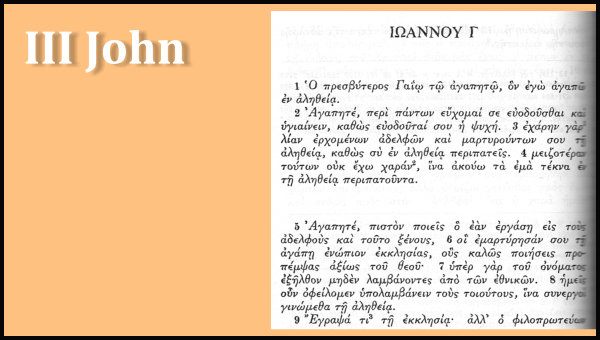By Tyson Thorne

Like II John, the author’s only reference to himself is the “elder.” There are, however, clear stylistic ties between all three letters, as well as the tradition of early church fathers, which attribute all three epistles to the apostle John. Once again, there is little evidence of the time of composition, but it is reasonable to suggest that all three were written sometime in the early (AD) 60’s. III John differs from the first two letters, however, as it is a personal correspondence to a single individual, rather than a church. It seems to suggest that, despite the possibility of incurring the wrath of his church bishop, Gaius ought to welcome the bearer of the letter to his home as a servant of the Lord. John tells of his disappointment with Diotrephes, and suggests that he will set things right on his next visit. The big idea of this letter is clear: A knowledge of God is evidenced in faithfully attending to God’s people, regardless of the consequences. A fitting message for today’s pastors.
In the salutation (verses one through four) John addresses Gaius with great affection, loving him not generally but in the truth. As in his first two epistles, John is concerned with believers loving their brothers in a manner consistent with God’s truth. Notice further that Gaius is not just a friend, but a dear friend (literally beloved) whose spiritual and physical needs John prays for. John, remembering Christ’s concern for people’s physical needs as well as their spiritual needs, continues to lift up Gaius’ health and livelihood before the Father. It pleased John to hear that Gaius was faithful to walk in God’s truth.
Commendation of Gaius
John praises Gaius for his hospitality to traveling missionaries. We know they are missionaries from verse seven, “It was for the sake of the name that they went out…” And John goes as far as to state that this hospitality is an act of faith (“you are faithful in what you are doing…”). Gaius’ hospitality matched perfectly with his faith, and was evidence of his faith. John knew this because in verse six he says these travelers reported back of Gaius’ faithful hospitality. In fact, John doesn’t stop by saying thanks, but exhorts him to do even more of the same! Examine the last sentence of verse six: “You will do well to [i.e., please] send them on their way in a manner worthy of God.” This is more than simply pumping their hand and telling them to “drive carefully.” It entailed helping to equip them for the next leg of their journey. This meant providing them with food, water, and any other provisions as they had need! And this equipping was to be in a manner worthy of God! Is God cheap? Is God selfish with His possessions? Is He stingy? Of course not, and neither should we. For in showing hospitality to our brother we assist them in their ministry and share in their success. After all, they were not holding down a regular job. They accepted no money or assistance from unbelievers. They were missionaries to the world, and to the point we are faithful in hospitality, we are responsible for their fruits.
Condemnation of Diotrephes
As in his first two letters, John likes to contrast excellent examples with strikingly poor examples. And while Gaius was an excellent example of Christian love for the brothers, Diotrephes was strikingly disobedient to the command of God to love the brethren. He put himself and his needs above everyone else, and tried to make himself look better than the apostles by maliciously gossiping about them. Instead of “sending them on their way in a manner worthy of God,” he would excommunicate anyone who tried to show hospitality! John would take care of this man’s disobedience on his next visit. In verse 11 John leaves little doubt as to his plans for Diotrephes: he will treat him as an unbeliever, as a man who “has not seen God.”
Recommendation of Demetrius
Demetrius was not only another traveling missionary, but also probably the bearer of the letter. In essence, III John is a letter of recommendation on Demetrius’ behalf. But the testimony about Demetrius goes beyond that of men and even of the apostles, the truth itself testifies on his behalf.
While John had communicated all he needed to, there was still much that he wished to discuss with Gaius, probably concerning Diotrephes’ abuses of power. The things to be discussed were probably too sensitive to be sent in a letter, and most likely a “face to face” meeting and confrontation with Diotrephes. This may hint at John’s philosophy of dealing with problem people: rather than sending a vicious letter of reproof, John preferred to prove his love by meeting with them personally. John then sends Gaius greetings from the friends with him, and asks that Gaius greet the friends there by name. The final emphasis on friendship may be John’s way of communicating that all believers are to be faithful friends. That Christianity itself is a network of friendship that is extended to anyone bearing the name of Christ. We are to trust and befriend all believers, whether they come from our local church or not.
|
|
